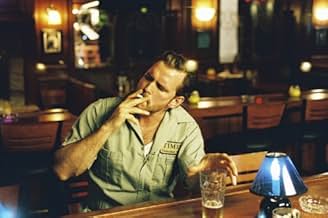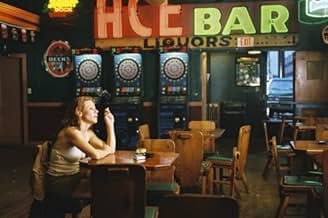Ajouter une intrigue dans votre langueThis drama centers on Hank Chinaski, the fictional alter-ego of "Factotum" author Charles Bukowski, who wanders around Los Angeles, CA trying to live off jobs which don't interfere with his ... Tout lireThis drama centers on Hank Chinaski, the fictional alter-ego of "Factotum" author Charles Bukowski, who wanders around Los Angeles, CA trying to live off jobs which don't interfere with his primary interest, which is writing. Along the way, he fends off the distractions offered b... Tout lireThis drama centers on Hank Chinaski, the fictional alter-ego of "Factotum" author Charles Bukowski, who wanders around Los Angeles, CA trying to live off jobs which don't interfere with his primary interest, which is writing. Along the way, he fends off the distractions offered by women, drinking and gambling.
- Réalisation
- Scénario
- Casting principal
- Récompenses
- 4 victoires et 5 nominations au total
- Tony Endicott
- (as Tom Lyons)
- Stripper
- (as Emily 'Sophia Simone' Hynnek)
Avis à la une
As a whole the film just didn't capture the feel of the Bukowski novel. It seemed too clean for some reason. The whole film just seemed a lot more tame than the literature. His writing captures this great sense of adventure, danger, and a frequent raw vulgarity. But also, it has a very artful heart to it. The movie missed this entirely, in my opinion.
But believe it or not though, I still think it's a good movie. Outside the actual interpretation of Charles Bukowski's novel, it's still fun watch, with generally good performances, and a phenomenal story to have been based on.
The dialog has lots of pop. Somewhat a film noir, somewhat a comic book, the film has a nice feel with the first person narration of Chinaski taking us on his tour. It could have been in black and white but is nicely filmed in color. One of those slightly rare movies as at home at a film festival (Cleveland's, in this case) or at your local theater.
Those episodes are all we get, and apart from brief writing and longer romantic interludes, they mainly concern a long round of short-lived jobs -- sorting pickles in a pickle factory, boxing brake shoes, dusting statues, driving a cab (a hard-on's no danger to the driver, the instructor says, but sneezing is), assembling bike parts, and so on, from which Hank is unfailingly soon fired for drunkenness or lateness, insubordination or other misdemeanors -- whereupon he goes back to writing, drinking, and sex -- which latter, Jan tells him, is no good when he gets successful as he does for a while playing the horses. (There's none of the post office sorting job Bukowski did for a long time.) For Bukowski and his alter ego being a seedy loser is a thing carried off with such chutzpah that it's sexy -- and drinking and sex are equally close ways to feed the libido. There are plenty of the ten-cent aphorisms the tireless writer worked at, and there's a plug for the Black Sparrow Press that eventually started to keep and publish his endlessly mailed out submissions and today still survives off maintaining the slob genius' ovre in public hands.
Bokowski appeals to the young, the easily impressed, the hard drinking, and those who like the pithy sayings and ignore the arrested development. For those of bourgeois mentality and upbringing there's a certain imperishably tonic thrill in watching a man who's been down so long it looks like up; who can tell the employer who's just fired him to give him his severance check immediately so he can hurry up and get drunk; for whom no flophouse or flat is too seedy, no bibulous girlfriend a worse drunk than he. How liberating it might be not to care about losing everything, knowing that since paper and pen are nearly free you'll never stop writing: or if you lose heart for a minute or two, a dip into the works of some other writer will encourage you in the belief that you can do better. Bokowski was a tough one.
Matt Dillon is Irish enough to have seen something of the hard drinking life himself. One senses that he knows whereof he speaks and can convey the alcoholic lifestyle without irony or melodrama. There's nothing quite like Lili Taylor coming out in her underwear to fix Hank a meal. His request is for another round of pancakes. "There's still no butter," she says. "Well, they'll be extra crisp," he replies.
In a smaller but still choice role Marisa Tomei is well disguised as another drunken lady Hank goes home with, finding that she lives with a flaky French millionaire called Pierre (Didier Flamand) with a little yacht and dreams of composing an opera. Hank's been taken off so many two bit jobs being fired has no sting left for him. Bukowski's persona is impenetrable and he's a simple survivor: he's almost utterly resistant to the forces of change his wayward lifestyle would activate in lesser beings and hence, unlike the downward spiraling drunk so movingly played by Nick Cage in Leaving Las Vegas, Bukowski's Hank in Dillon's performance cannot build toward pathos or true depth. As suggested, this film doesn't develop its sequences and relationships as thoroughly as Barfly, for which Bukowski himself wrote the screenplay, giving it a continuity and focus Factotum's more cobbled-together script doesn't quite muster.
There's something condescending and cultish in the European cultivation of the Bukowski myth in which this is another short chapter. Factotum is an occasionally amusing, at moments laugh-out-loud kind of movie that's well served by all the principals and by director Hamer's dry wit and restraint, but after the desultory and boring stretches have eventually started to pile up you may begin to say: So what? and wish the fresh novel feel of the early scenes could've been better sustained throughout. Not to fault the editing, but mightn't a native's keener ear for the rhythms of the dialogue have kept the flow going better? This is one to see if you like Matt Dillon or Bukowski; otherwise, save your time.
What may scare most fans away from this though, is pretty face Matt Dillon. He does not have the personality, understanding or the looks to match Chinaski. This is the main hindrance of this movie. Lili Taylor and Marisa Tomei comes better off, giving solid performances.
If you're a fan of Buk, go check it out. If you're a fan of good cinema, check it out as well. Bent Hamer is a man of vision.
He drinks, smokes, womanizes :), and writes all the time. His writing (much like Charles Bukowski's, the author of the book this movie is based on, dead in 1994 at 74 years old) is based on his own life and feelings and seems compulsional: he needs to write more than he needs to be read.
Now, about the movie. It is rather slow paced, close to boring. Matt Dillon plays very well his role and he has never looked and felt like Bruce Campbell in his life. When the movie ended, though, I felt I have been enriched somehow. A lot of the modern pressure of proving something, having a home, getting a job, the things that we start to think define us, all these things have no power on Matt Dillon's character. Of course, in Romania such a guy would have starved a long time ago, but still... A bit like The Big Lebowski, it shows that there are alternate lifestyles right next to us. You can make the choice to lose women, friends, family, but go all the way in the direction of your choosing. And after all, this is what Factotum is all about.
Bottom line: you need to be in the mood for a slow film, but it is worth it.
Le saviez-vous
- AnecdotesOn 14 April 2005, in Trondheim, Norway, this became the first movie in the world to be shown with a 4K digital cinema projector.
- GaffesThe title screen displays: "factotum [a man who preforms many jobs]"--should be "performs many jobs".
- Citations
[last lines]
Henry Chinaski: [voiceover] If you're going to try, go all the way. Otherwise don't even start. This could mean losing girlfriends, wives, relatives, jobs, and maybe your mind. It could mean not eating for three or four days. It could mean freezing on a park bench. It could mean jail. It could mean derision. It could mean mockery, isolation. Isolation is the gift. All the others are a test of your endurance. Of how much you really want to do it. And you'll do it, despite rejection in the worst odds. And it will be better than anything else you can imagine. If you're going to try, go all the way. There is no other feeling like that. You will be alone with the gods. And the nights will flame with fire. You will ride life straight to perfect laughter. It's the only good fight there is.
- Bandes originalesI Wish to Weep
Lyrics by Charles Bukowski
Music by Kristin Asbjørnsen
Performed by Dadafon
Mixed by Magnus Torkildsen at Barracuda
Meilleurs choix
- How long is Factotum?Alimenté par Alexa
Détails
- Date de sortie
- Pays d’origine
- Langue
- Aussi connu sous le nom de
- Factotum: A Man Who Performs Many Jobs
- Lieux de tournage
- Sociétés de production
- Voir plus de crédits d'entreprise sur IMDbPro
Box-office
- Budget
- 1 000 000 $US (estimé)
- Montant brut aux États-Unis et au Canada
- 808 221 $US
- Week-end de sortie aux États-Unis et au Canada
- 59 212 $US
- 20 août 2006
- Montant brut mondial
- 2 708 087 $US
- Durée1 heure 34 minutes
- Couleur
- Mixage
- Rapport de forme
- 1.85 : 1





























